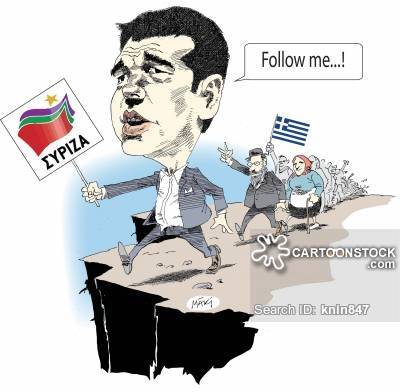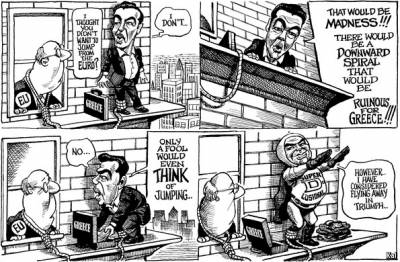How Syriza wasted the unique chance to change Greece.
After Syriza had won the election on January 25th the re was all reason to hope for change. For the first time a new party came into rule, not indulged in the bad habits of the old system. Syriza became only a serious factor after the elections in 2012 and had now in 2015 the chance to form the government. Despite the less enlightening choice to form a coalition with the right-wing populists there was hope for a better Greek future. Not only that there was a chance to get rid of bad old habits and to reform Greece, the government got also all the credit needed from their creditors and fellow Euro group members to change the austerity deal and to substitute it with a better package of measures that would lead to a financial sustainable Greece.
re was all reason to hope for change. For the first time a new party came into rule, not indulged in the bad habits of the old system. Syriza became only a serious factor after the elections in 2012 and had now in 2015 the chance to form the government. Despite the less enlightening choice to form a coalition with the right-wing populists there was hope for a better Greek future. Not only that there was a chance to get rid of bad old habits and to reform Greece, the government got also all the credit needed from their creditors and fellow Euro group members to change the austerity deal and to substitute it with a better package of measures that would lead to a financial sustainable Greece.
Now, five month later all the hope is in tatters and Greece is on the brink of bankruptcy and Grexit. How could that happen?
Before answering that it is good to look back on some key point from the last five month. The first irk in the relation between Greece and its creditors came already at the first meeting with the so called Troika, the group of experts from the institutions (ECB, IMF and Euro group) when Tsipras, then new Greek PM, simply refused to talk anymore to them. Even the calm and controlled chairman of the Euro group, Dijsselbloem, was speechless for a moment. In mid-February was the first Euro group meeting. Instead of bringing new ideas and proposals to the table Varoufakis, the new Greek finance minister, stunned his colleagues by trying to lecture them. It’s certainly okay to explain why one thinks that the others are wrong – but that needs also new proposals. Just arguing that everything has to be done completely different without saying how, only communicating what you don’t want without coming with credible alternatives is simply not working at all – never and nowhere.
The situation worsened when Syriza undid reforms implemented by the previous government – as reemploying 13,000 state employees. Some changes made sense – as supporting people living below the minimum – but doing so means also to cut costs somewhere else, but that was a red line for Syriza. Speaking about red lines – that was a common threat. No to reforming the pension system, which is completely unstainable, no to reforms of the labour market, no to privatisations and so on. The only solution presented by Tsipras and Varoufakis was debt forgiveness. But they ignored the fact that this to happen would need first a financially sustainable Greece. Otherwise the risk is too high that the situation of high unsustainable debt will be back in a couple of years.
As that idea did not work Greece introduced claims dating from World War II. As much as there is a point in having a look at this – and has neither to do with the Greek financial situation nor would the majority of such payments belong to the government. Mixing this topic into the debt discussion achieved only one thing: angered creditors and an irritated Germany.
 New try: “The Greek people elected us based on the promise that we end austerity and stop co-operation with the Troika. This is democracy – and therefore you have to give us money without any conditions attached to it.” Nice try – and certainly right on the first part. But – a democratic election in one country has nothing to say about other countries. The Greek can obviously choose to stop – but that means also to accept default. And yes of course the situation of many Greeks is bad – but that does not give Syriza the right to claim money from other countries. In some of those the people are even poorer and they do not complain or request money. Or they have endured hardship of austerity to avoid default – how can they now be asked to give money away because in Greece they don’t want the pain? What kind of understanding of solidarity or democracy is that, Mr. Tsipras and Mr. Varoufakis?
New try: “The Greek people elected us based on the promise that we end austerity and stop co-operation with the Troika. This is democracy – and therefore you have to give us money without any conditions attached to it.” Nice try – and certainly right on the first part. But – a democratic election in one country has nothing to say about other countries. The Greek can obviously choose to stop – but that means also to accept default. And yes of course the situation of many Greeks is bad – but that does not give Syriza the right to claim money from other countries. In some of those the people are even poorer and they do not complain or request money. Or they have endured hardship of austerity to avoid default – how can they now be asked to give money away because in Greece they don’t want the pain? What kind of understanding of solidarity or democracy is that, Mr. Tsipras and Mr. Varoufakis?
The next act in testing the patience of the creditors was flirting with Putin and even threatening to veto sanction new against Russia, which were discussed as answer to Russia’s annexation of Crimea and its role in Eastern Ukraine.
And so it went on for five month – forming a loop of promises, broken promises, lecturing instead of listening or negotiating, blaming other, emergency talks and new hope, threats, accusations and a new promise to start the loop all over again.
At the end even the most patient one, Juncker, reached the end of understanding Syriza when Tsipras first signalled hope after another emergency meeting in June but had nothing better to do than to insult and blame his EU partners in a speech to his parliament on the very next day. Nevertheless, all Euro zone leaders and Euro group ministers agreed to yet another deciding meeting – while time is really running out. On Monday all of them came to Brussels – just to witness another round of Greece playing a game of chicken instead of producing a serious proposal. At least there was some hope. Although there are still hardly any reforms in the Greek proposal there were at least serious ideas on getting the Greek budget balanced. Time is running out and yesterday saw another fruitless Euro group meeting – but there is still hope.
But back to the question: How could this happen? Inexperience certainly plays a role, but far more it was misjudgement, playing foul and the missionary attitude of Syriza, seeing itself as the only one that has seen the truth. An attitude of “if everyone will follow us the world would be a better place”, neglecting the world around them – sometimes even drifting into arrogance. Or to say it in the words of an official from Brussels: they are ignoring reality and living in their own cloud-cuckoo land. With their abrasive approach Tsipras and Varoufakis only managed that Greece is less trusted – what will lead to even more onerous conditions on new loans.
Syriza had the opportunity to change the country and to change the conditions on the loan by coming with credible alternatives, everyone was open for that. But they produced none. Even the latest proposal, the most serious so far, has mainly ideas on new taxes and hardly any structural reforms or cuts in spending.
 Furthermore Syriza has done nothing to break with the bad habits of the old parties nor tackle the pathologies of Greece. They have done nothing yet to defang the oligarchs or to collect taxes on black money. The Greek government had received a list of 2,059 names regarding potential tax evasion. So far only 49 cases have been looked at and in only 15 cases help from the Swiss government was requested. Even worse – a proposal of the Swiss government to collect a source tax has got no reaction from the Greek side. And even clientelism is still there with Syriza.
Furthermore Syriza has done nothing to break with the bad habits of the old parties nor tackle the pathologies of Greece. They have done nothing yet to defang the oligarchs or to collect taxes on black money. The Greek government had received a list of 2,059 names regarding potential tax evasion. So far only 49 cases have been looked at and in only 15 cases help from the Swiss government was requested. Even worse – a proposal of the Swiss government to collect a source tax has got no reaction from the Greek side. And even clientelism is still there with Syriza.
The losers at the end are the Joes down the street of Greece. Syriza has done a terrible disservices to their voters. With its actions it managed to kill the growth that just had emerged – and most Greek are worse of now than before Syriza took power. That is the real Greek tragedy: the Greek get betrayed again. Nothing has changed, only that they get now betrayed by the far left and communists of Syriza.